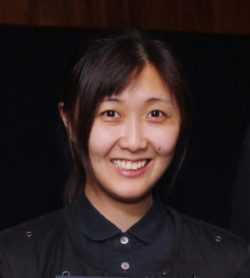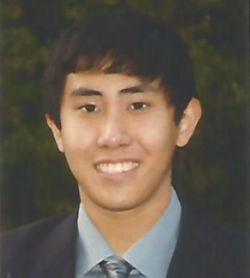By Greta Shum
Graduate students Hongshan Guo and Evan Zhao have been named the recipients of Princeton University’s Maeder Fellowship in Energy and the Environment for the 2018-2019 academic year. Guo is a doctoral student in the School of Architecture. Zhao is a doctoral student in the Department of Chemical and Biological Engineering.
Each year, Princeton faculty members nominate candidates for this honor by drawing upon top graduate students performing research related to energy and the environment. Selection for the fellowship, which is supported by the Paul A. Maeder ’75 Fund for Innovation in Energy and the Environment, is based on the promising potential of the researcher and his or her accomplishments.
For this edition of “People Spotlight” at the Andlinger Center, we feature our two 2018 – 2019 Maeder graduate fellows.
Hongshan Guo
 Hongshan Guo has a background in mechanical engineering, energy systems and building simulation. She is currently a fourth-year Ph.D. student at Princeton, where she has been studying the relationship between the built environment and the thermal comfort of the occupants inside it. She is pursuing the architecture school’s technology and computational design track and is advised by Forrest Meggers, assistant professor of architecture and the Andlinger Center for Energy and the Environment.
Hongshan Guo has a background in mechanical engineering, energy systems and building simulation. She is currently a fourth-year Ph.D. student at Princeton, where she has been studying the relationship between the built environment and the thermal comfort of the occupants inside it. She is pursuing the architecture school’s technology and computational design track and is advised by Forrest Meggers, assistant professor of architecture and the Andlinger Center for Energy and the Environment.
She is involved in several research projects that investigate urban water issues and geothermal energy delivery. So far, her work has taken a close look at the way energy is transferred to the built environment. Her research interests also extend from building components, such as the electrical, mechanical or plumbing structure, to the indoor environment and beyond to ways of measuring comfort in outdoor locations.
“I’m very excited to receive the Maeder Fellowship,” Guo said. “It was already a huge privilege for me to be working in the Andlinger Center with so many different researchers from drastically different disciplines. The fellowship encourages me to push those collaborations further and hopefully I will keep up the momentum for the rest of my career.”
Next year, with the support of the Maeder Fellowship, Guo will be investigating the disconnect between the energy that is supplied to buildings to manage the room temperature and the energy necessary to provide comfort to the occupants.
Evan Zhao
 Evan Zhao is a third-year Ph.D. student working with José Avalos, assistant professor of chemical and biological engineering and the Andlinger Center for Energy and the Environment. His research investigates ways to improve metabolic engineering by using light to control the rate at which these chemical reactions take place. In metabolic engineering, one goal is to reprogram the genetics of microbes to produce biofuels, non-fossil fuel-derived chemicals, or pharmaceuticals. Since microbes have not naturally evolved to make such chemicals, the microbe’s metabolic goals are often in direct conflict with the production of a chemical of interest.
Evan Zhao is a third-year Ph.D. student working with José Avalos, assistant professor of chemical and biological engineering and the Andlinger Center for Energy and the Environment. His research investigates ways to improve metabolic engineering by using light to control the rate at which these chemical reactions take place. In metabolic engineering, one goal is to reprogram the genetics of microbes to produce biofuels, non-fossil fuel-derived chemicals, or pharmaceuticals. Since microbes have not naturally evolved to make such chemicals, the microbe’s metabolic goals are often in direct conflict with the production of a chemical of interest.
The method Zhao uses in the lab involves introducing light-activated proteins to control these cellular processes, a process known as “optogenetics.” In recent research Zhao published with his collaborators in Nature, he showed that light-based modules permit instant and reversible control over cellular metabolism. Next year, with the support of the Maeder Fellowship, he will focus on fine-tuning the broad toolkit that he created for specific chemical products to address current process inefficiencies, which will also demonstrate its utility in challenging metabolic engineering applications.
“I’m thankful to be given the opportunity to continue working with my colleagues on a technology we hope can someday provide the world with a sustainable chemical production economy,” said Zhao.
The ultimate goal is to develop a technology that would enable a sustainable and environmentally-friendly chemical production economy. Specifically, this research has applications for producing advanced biofuels, fragrances, plastics and pharmaceutical ingredients.